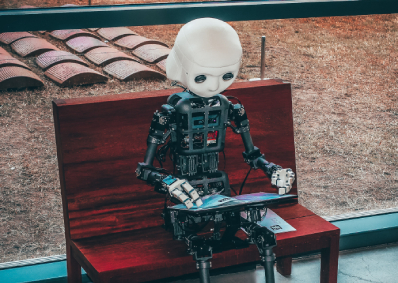ChatGPT, Google Bard, and Jasper AI…oh my! No one is denying how impressive artificial intelligence large language models (LLMs) are. In fact, they’re SO impressive that many Americans fear that the robot takeover is imminent. We’ve seen cashiers, warehouse workers, and, recently, drive-thru operators at Wendy’s replaced by technology, and with AI getting so powerful, worries abound that other jobs will be obsolete soon. We wanted to know: who is the most afraid of the big bad AI takeover? To learn more, we conducted a survey of currently-employed U.S. residents to see who is the most concerned about AI domination. Key takeaways: ● 48% of Americans are concerned about an AI takeover ● Over 60% of workers in customer service and retail are concerned about AI job loss ● 1 in 3 tech workers are afraid of AI misuse by corporations and government ● 68% think there should be universal basic income to mitigate job displacement due to AI
Who Fears the AI Takeover Most?
Based on our survey, a staggering 50% of Americans are concerned about AI replacing their jobs. We asked ChatGPT—we just had to—if AI will replace “all jobs,” and it said the careers that involve mundane and repetitive tasks or rule-based decision-making are most at risk. Americans agree. The most concerned workers are employed in customer service, where 61% of them worry that AI will soon replace them.
 Following retail workers, the next five professions that show the most concern about AI impacting their job security were those in food service, machine operation, IT positions, and administrative roles. A majority of the surveyed employees in these sectors anticipate that AI could compromise their employment within the next five years.
Of the major cities in the country, residents in San Francisco are the most concerned about losing their jobs to AI, with 89% responding that they were at least a little worried.
The cities with residents most worried about losing their jobs to AI are:
● San Francisco, CA: 89%
● Los Angeles, CA: 75%
● Minneapolis, MN: 67%
● Tampa, FL: 63%
● Seattle, WA: 60%
● Phoenix, AZ: 60%
● New York, NY: 59%
● Nashville, TN: 58%
● Chicago, IL: 57%
● Dallas, TX: 57%
● Raleigh, NC: 57%
● Denver, CO: 55%
● Milwaukee, WI: 55%
Gen Zers and Millennials were the most worried of all the generations, with 60% and 52%, respectively, expressing AI concerns. Gen X was less worried, and baby boomers even less. We expect that the role age plays in AI anxiety could be twofold: older generations have less time to go in the workforce, and they’re less likely to be totally in tune with budding technology.
Following retail workers, the next five professions that show the most concern about AI impacting their job security were those in food service, machine operation, IT positions, and administrative roles. A majority of the surveyed employees in these sectors anticipate that AI could compromise their employment within the next five years.
Of the major cities in the country, residents in San Francisco are the most concerned about losing their jobs to AI, with 89% responding that they were at least a little worried.
The cities with residents most worried about losing their jobs to AI are:
● San Francisco, CA: 89%
● Los Angeles, CA: 75%
● Minneapolis, MN: 67%
● Tampa, FL: 63%
● Seattle, WA: 60%
● Phoenix, AZ: 60%
● New York, NY: 59%
● Nashville, TN: 58%
● Chicago, IL: 57%
● Dallas, TX: 57%
● Raleigh, NC: 57%
● Denver, CO: 55%
● Milwaukee, WI: 55%
Gen Zers and Millennials were the most worried of all the generations, with 60% and 52%, respectively, expressing AI concerns. Gen X was less worried, and baby boomers even less. We expect that the role age plays in AI anxiety could be twofold: older generations have less time to go in the workforce, and they’re less likely to be totally in tune with budding technology.
How AI Adoption Is Affecting Workers
At present, AI is changing job responsibilities and reducing overall job opportunities for more than half of America. A total of 53% of survey respondents mentioned that their jobs are changing because of AI, and 52% noted that they’ve seen fewer opportunities to get jobs and advance in their companies because of artificial intelligence.
 Fewer U.S. residents—just over 40%—report that they’re seeing a demand for new skills at their jobs as AI infiltrates the workspace. Around a third of Americans are reporting job loss and wage reduction or stagnation because of programs like ChatGPT and Google Bard.
As AI improves, it continues to change job responsibilities and demand more from workers—think: employers are looking for cyber-enhanced skill sets rather than plain old boring human ones.
And in response, employees are concerned that they won’t be able to adopt the new skills required in order to stay relevant in the ever-more-technological world.
Machine operators are the least confident that they’ll be able to adapt to the new AI landscape, with 40% stating they won’t. Just under a quarter of all employees in four other industries have doubts too, including business professionals, manual laborers, healthcare workers, and those in customer service.
Fewer U.S. residents—just over 40%—report that they’re seeing a demand for new skills at their jobs as AI infiltrates the workspace. Around a third of Americans are reporting job loss and wage reduction or stagnation because of programs like ChatGPT and Google Bard.
As AI improves, it continues to change job responsibilities and demand more from workers—think: employers are looking for cyber-enhanced skill sets rather than plain old boring human ones.
And in response, employees are concerned that they won’t be able to adopt the new skills required in order to stay relevant in the ever-more-technological world.
Machine operators are the least confident that they’ll be able to adapt to the new AI landscape, with 40% stating they won’t. Just under a quarter of all employees in four other industries have doubts too, including business professionals, manual laborers, healthcare workers, and those in customer service.
Americans’ Worst AI Fears
A third of all U.S. workers are afraid that AI will make their jobs obsolete in the next five years. That includes 56% of retail workers, 40% of those in janitorial services, manual labor, and machine operation, and 36% who work as administrative support specialists.
 Even the godfather of AI, Geoffrey Hinton, sees the potential negative impact his work could have on the country and the world as a whole. He recently told The Verge, “I console myself with the normal excuse: If I hadn’t done it, somebody else would have. [But]...it is hard to see how you can prevent the bad actors from using it for bad things.”
Now all that’s left is to get ChatGPT to admit that AI could be massively detrimental to the world.
Even the godfather of AI, Geoffrey Hinton, sees the potential negative impact his work could have on the country and the world as a whole. He recently told The Verge, “I console myself with the normal excuse: If I hadn’t done it, somebody else would have. [But]...it is hard to see how you can prevent the bad actors from using it for bad things.”
Now all that’s left is to get ChatGPT to admit that AI could be massively detrimental to the world.
AI Threatens Creative Work, Too
It’s easy to think, “Well, AI can do mundane tasks, but it can’t create like humans can, right?” WRONG. Just over 40% of our survey participants couldn’t tell an AI-written paragraph from human writing, and 59% think AI will soon become smarter than humans altogether.
 But will AI replace more jobs than it creates? Well, 82% believe it will. With concerns about a total AI takeover, 62% of Americans believe we need to implement a universal basic income to combat AI-fueled job loss.
But will AI replace more jobs than it creates? Well, 82% believe it will. With concerns about a total AI takeover, 62% of Americans believe we need to implement a universal basic income to combat AI-fueled job loss.
Is the AI Takeover Imminent?
Maybe. Most U.S. workers have already reported the negative effects AI has had on careers and the job market, and around half of Americans are concerned that their jobs will be replaced by AI in the next five years. And just so you know…this entire article was written by an AI tool. Just kidding. Or are we?
Methodology
We surveyed 1,000 Americans in May 2023 about changes AI is making to their jobs currently and changes they expect in the next five years. The average age of survey participants was 38. 53% were male, 45% were female, and the remaining 2% identified as non-binary or other.
Fair Use
Feel free to use any stats or images in this article for non-commercial use. Please just be sure to link back to this page to give credit.







